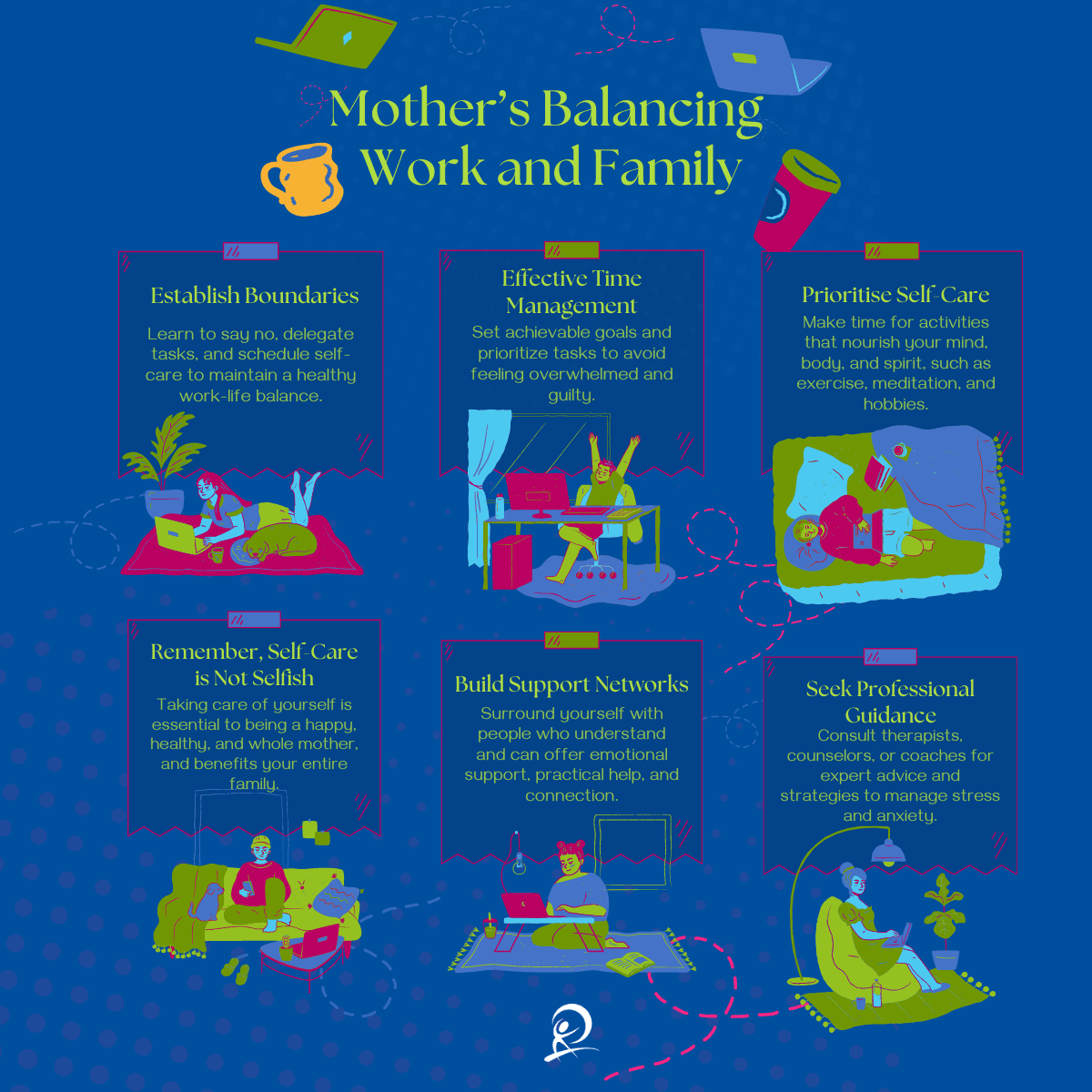
Introduction
As Mother’s Day approaches, we celebrate the love, care, and dedication that mothers bring to their families. However, being a mother can be a challenging and overwhelming experience, especially when balancing work and family responsibilities. This article will explore the strain between work and family, the importance of personal time for mental well-being, and practical tips for achieving balance. We will also discuss how Cognitive Behavioural Therapy (CBT) and Schema Therapy can help mothers manage stress and improve relationships.
The Strain Between Work and Family
Mothers from working families often struggle to balance work and family responsibilities, leading to feelings of guilt, anxiety, and burnout.
The double burden of work and family responsibilities can be overwhelming as mothers strive to meet their job’s demands while ensuring the needs of their families are met. In many circumstances, a mother may feel guilty for not spending enough time with her children because she works long hours and worries about meeting her work deadlines. This pressure to excel in work and motherhood can cause constant guilt, as women feel they are never fully present or dedicated enough in either area.
The time commitment of motherhood is significant, with mothers spending an average of 25 hours per week on childcare and 15 hours per week on household work, in addition to their paid work hours, which can leave mothers feeling exhausted and drained, with little time for personal pursuits or self-care. For many families, a mother may spend most of the week caring for her children and managing the household, leaving her no time to relax or pursue her interests.
According to a 2020 report by the United Nations, women still carry out the bulk of unpaid care work, spending, on average, three times longer than men on household chores and caregiving. These responsibilities can limit women’s ability to participate fully in the workforce, with women often having to take on part-time or flexible jobs to balance work and family commitments. Furthermore, a study by the Pew Research Centre found that 69% of mothers with children under 18 said they had taken a significant amount of time off work to care for a child or family member. Overall, this can have long-term effects on women’s careers, with many women experiencing a “motherhood penalty” in terms of lower pay and fewer opportunities for advancement.
To balance work and family responsibilities, we need to challenge traditional gender roles and societal expectations. Employers can help by providing flexible work arrangements, parental leave, and caregiver support. Governments can implement work-life balance policies, such as subsidised childcare and family-friendly benefits. Mothers must prioritise self-care, seek support from loved ones and professionals, and understand that their well-being is essential to their families’ happiness and success. By taking these steps, we can create a more supportive environment that values the well-being of mothers and their families.

Uncovering the Hidden Costs of Motherhood
Mothers are the ultimate multitaskers, effortlessly juggling multiple responsibilities. However, this incredible ability to manage numerous tasks comes at a cost. A disturbing pattern emerges when we delve into how mothers allocate their time. A typical week for a mother is a delicate balancing act, with time divided between paid work, childcare, household chores, and personal activities. A closer examination of this time dedication analysis reveals a concerning trend. Mothers spend significant time on paid work (40 hours) and childcare (25 hours), essential for their family’s well-being. However, this leaves limited time for household work (15 hours) and personal activities (5 hours). The consequences of this time imbalance are far-reaching, leading to burnout, decreased mental well-being, and a sense of perpetual exhaustion.
The sacrifice of personal time is a common theme among mothers. With only 5 hours dedicated to self-care and relaxation, mothers often find themselves physically and mentally drained, leading to a decline in mental health, relationships, and overall quality of life. The pressure to prioritise family responsibilities over personal needs can result in feelings of guilt and shame, making it even more challenging for mothers to take time for themselves.
Often, Mothers tend to prioritise the needs and desires of others above their own. This cultural bias can lead to a cycle of self-sacrifice and a sense of martyrdom, where mothers feel they must sacrifice their happiness for the sake of their families. Unfortunately, this societal pressure can perpetuate this cycle and make it difficult for mothers to prioritise their well-being. However, it’s essential to recognise that mothers’ personal time is not a luxury but a necessity. Mothers can recharge, refocus, and become more effective in their multiple roles by prioritising self-care and relaxation.
Overall, we can strive to create a more supportive society for mothers by acknowledging the time they dedicate to work, family, and loved ones over and above themselves and its consequences. We can strengthen families and communities by valuing the contributions of mothers and prioritising their well-being. It is time to recognise the incredible contribution of mothers and provide them with the necessary support to thrive.
Talk Therapy: Cognitive Behavioural Therapy (CBT) and Schema Therapy
Cognitive Behavioural Therapy (CBT) and Schema Therapy are both effective forms of talk therapy that can assist mothers in managing pressure, enhancing relationships, and boosting their satisfaction. Let’s examine each concept to see how it may apply to motherhood.
 Cognitive Behavioural Therapy (CBT)
Cognitive Behavioural Therapy (CBT)
CBT is a problem-focused approach that helps individuals identify and change negative thought patterns and behaviours that contribute to their mental health issues. It’s like having a personal coach who enables you to recognise and challenge your negative self-talk and replace it with more constructive thinking. For example, Sarah, a stay-at-home mum of two, often thinks, “I’m a bad mother because I can’t keep the house clean” (cognitive distortion). Her therapist helps her challenge this thought by asking her to list her accomplishments and evidence that contradicts this belief. Sarah learns to replace this thought with a more constructive one, “I’m doing my best as a mother, and it’s okay to have a messy house sometimes.”
In the context of motherhood, CBT can help mothers identify and challenge negative thought patterns that lead to stress and anxiety. For instance, a mother may think, “I’m not doing enough for my children” (cognitive distortion). CBT can help her challenge this thought and develop more constructive ways of coping.
Schema Therapy
Schema Therapy, developed by Dr. Jeffrey Young, focuses on identifying and changing deep-seated patterns and beliefs, known as schemas, that contribute to mental health issues. Schemas are like filters that shape our perceptions and behaviours, perpetuated through experiences, relationships, and cultural influences. For instance, Emily, a working mum of three, has a schema of self-sacrifice that developed from her childhood experiences of putting others first. Her therapist helps her understand how this schema has led to her feelings of guilt and inadequacy. Through Schema Therapy, Emily learns to recognise and challenge her schema, developing more constructive ways of dealing with stress and anxiety.
For Mothers, Schema Therapy can help them identify and challenge deep-seated schemas that contribute to stress and anxiety. For example, a mother may have a schema of perfectionism developed from societal expectations and cultural influences. Schema Therapy can help her recognise and challenge this schema, developing more constructive ways of coping with stress and anxiety.
Applying CBT and Schema Therapy
Let’s say you’re a mother who is struggling with guilt and anxiety about taking time for yourself. You may feel you must devote all your time and attention to your children and neglect your needs. Here’s how you can apply CBT and Schema Therapy to overcome these negative thoughts:
1. Identify your negative thought pattern: Recognise when you have negative thoughts like “I shouldn’t take time for myself because it’s selfish.”
2. You can challenge your negative thought pattern: Please ask yourself if this thought is true and what evidence you have to support it.
3. Replace your negative thought pattern with a more constructive one: Instead of thinking, “I shouldn’t take time for myself because it’s selfish,” try thinking “Taking time for myself is important because it helps me be a better mother.”
4. Identify your schema: Recognise that you may have developed a schema of self-neglect from your childhood experiences of putting others first.
5. Challenge your schema: Ask yourself if it’s true that you must always neglect your own needs and what the consequences of doing so might be.
6. Replace your schema: Replace your schema of self-neglect with a more constructive one that acknowledges that you deserve to prioritise your own needs and take care of yourself, too. Remember, taking care of yourself is essential and can help you be a better mother in the long run.
By applying CBT and Schema Therapy, mothers can develop more constructive ways of thinking and coping with stress and anxiety. Remember, taking care of your mental health is not selfish – it’s essential for being a happy and healthy mother.[/caption]
Practical Tips for Achieving Balance

Here are some further practical tips for achieving balance and improving mental well-being for mothers.
- Set Realistic Expectations
As mothers, we often put others’ needs before our own, leading to an overwhelming sense of responsibility. We must set realistic expectations for ourselves and our families to achieve balance. Learn to say no to commitments that drain your energy and say yes to those that nourish your mind, body, and soul. Set boundaries with your loved ones, colleagues, and friends to protect your time and energy. Caring for yourself is not selfish; being a happy and healthy mother is necessary.
For example, if you’re a working mother, set realistic expectations about your work hours and responsibilities with your employer and colleagues. If you’re a stay-at-home mum, set boundaries about your alone time and self-care routines with your family members. By setting realistic expectations, you can avoid feeling overwhelmed and maintain balance.
- Effective Time Management
Effective time management is crucial for mothers to balance their multiple roles and responsibilities. Prioritise your tasks, focusing on the most important ones first. Use a schedule or planner to organise your day, week, and month. Set reminders and alarms to stay on track and take regular breaks to recharge. Remember, taking short breaks can help you refocus and increase productivity.
For instance, if you’re a working mother, prioritise your work tasks and allocate specific times for your family and personal responsibilities. If you’re a stay-at-home mum, prioritise childcare responsibilities and allocate time for self-care, household chores, and individual activities. By prioritising and managing your time effectively, you can reduce stress and maintain balance.
- Build Support Networks
Building support networks is vital for mothers to maintain their mental well-being. Connect with other mothers in your community, join a support group, or seek professional guidance. Having a supportive network can help you feel less isolated and more empowered to manage the challenges of motherhood. For example, join a local mothers’ group or online community to connect with other mothers who share similar experiences and challenges. You can also seek support from your partner, family, or friends who can offer emotional support and help with childcare or household responsibilities. By building a support network, you can reduce feelings of loneliness and increase your sense of belonging.
- Seek Professional Guidance
Seeking professional guidance is essential for mothers to manage stress, improve relationships, and maintain their mental well-being. Consider therapy or counselling to address specific issues or challenges you’re facing. A professional therapist or counsellor can offer personalised guidance, support, and strategies to manage your mental health.
If you’re struggling with postpartum depression, anxiety, or relationship issues, consider seeking professional help. A therapist or counsellor can help you develop coping strategies, improve communication skills, and enhance relationships with loved ones. You can take proactive steps to maintain your mental well-being and achieve balance by seeking professional guidance.
Conclusion
Motherhood is an enriching experience that comes with its own unique set of challenges. Let’s take a moment to appreciate all the fantastic mothers working tirelessly to keep their families happy and healthy this Mother’s Day. As a mother, it’s crucial to prioritise your mental well-being and maintain a healthy work-life balance. You can find joy and balance by understanding the tension between your work and family responsibilities, dedicating time to your well-being, and seeking practical tips and professional guidance when needed. Remember, taking care of yourself is not selfish; it’s essential. So, from all of us, we wish all the amazing mothers out there a very Happy Mother’s Day!
Sign up for “The ProActive Weekly” newsletter for more insights and support on mental well-being and work-life balance.


